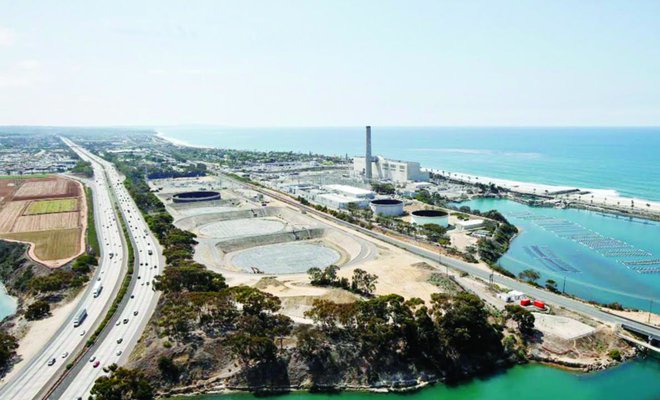
California looks to Saudi Arabia for desalination expertise
As water shortages become a reality across the globe, authorities in drought-prone areas are looking to Saudi Arabia’s desalination industry for inspiration.
The Kingdom produces more desalinated water than any other nation, with 27 plants transforming sea brine into five million cubic meters of fresh water a day.
The industry has grown rapidly in recent years. In January, the Kingdom announced plans to invest more than $500 million (SR1.874 billion) to build nine plants in Jeddah.
It is not the only area trying to meet the needs of a growing population demanding more fresh water. After experiencing acute drought between 2011 and 2017, the US state of California is expanding desalination projects. Grants of $35 million were approved this year for a variety of desalination ventures as municipalities across the state seek to diversify water portfolios.
Experts in California have been studying the Kingdom’s desalination projects. “The value of what is going on in Saudi Arabia and the Arab world is the recognition that water … is necessary for both long-term community and economic survival, and that good planning is key,” said Paul Kelley, the executive director of CalDesal, a not-for-profit advocacy group. He added that Saudi Arabia’s foresight in planning for a “water resilient” future was a lesson that California would do well to follow.
Increasing both the volume and efficiency of water production is among the many goals laid out in Saudi Arabia’s National Transformation Program (NTP) 2020 and Vision 2030, which seeks to wean the country from oil reliance, and build a more sustainable economy. At a conference last month, the Minister of Environment and Agriculture announced a $1.3 billion investment in water technology projects to upgrade and further develop infrastructure.
While cutting-edge desalination technology has been developed in California’s top research institutions for decades, complicated regulatory frameworks and politicians have hindered the broader application of the process, said Yoram Cohen, director of the Water Technology Research Center at the University of California, Los Angeles. “It’s one thing to develop the technology, it’s another to actually push for its deployment,” he added.
While acknowledging that the water needs of California vary greatly from those in Saudi Arabia, Cohen said the golden state could learn much from the political will shown in the Kingdom to prioritize desalination. “They’re moving forward,” he said of counterparts in Saudi Arabia.
In California, which sets strict limits on greenhouse-gas emissions, critics of desalination have long cited its environmental footprint as massive inputs of energy are required to run the plants separating salt from water.
However the industry may be moving toward a greener, future. In February, Saudi Arabia announced plans to develop a $58 million solar-powered desalination plant near King Abdullah Economic City. Construction began on the project this month, with the plant scheduled to be up and running by 2020.
It is an important step forward, Cohen said: “It illustrates that one can move toward sustainability in a dual mode — where you use renewable energy and you use renewable sea water.
“You don’t want to continue desalinating using precious energy sources, including petroleum or gas: solar energy is the way to go. That’s an investment in the future.”
Creativity and good-planning will be necessary as both Saudi Arabia and California develop resource-management plans for the future, Kelley said. While Saudi Arabia has been “pushing the innovative envelope” by investing in desalination projects and research, examples of poor governance abound.
Aside from the dramatic water shortages seen in California during the recent drought, the recent admission by municipal leaders that Cape Town would run out of potable water by this summer has renewed calls for investment in desalination. “They could well have done some desalination and followed the model of Saudi Arabia and other places around the world to make sure that at least a third of their water supply was drought-resistant,” Kelley said of Cape Town.
With global warming increasing temperatures worldwide and once-predictable weather patterns thrown into flux, the Kingdom’s commitment to reliable supplies will be “very applicable to the rest of the world,” he added.



























